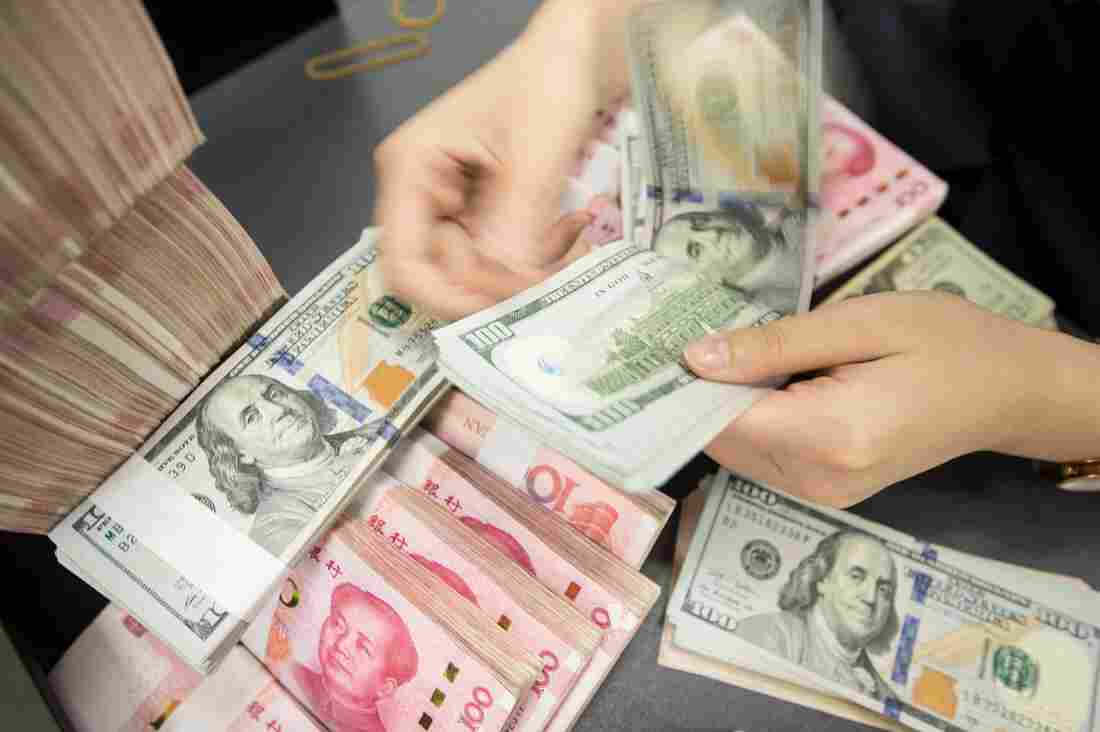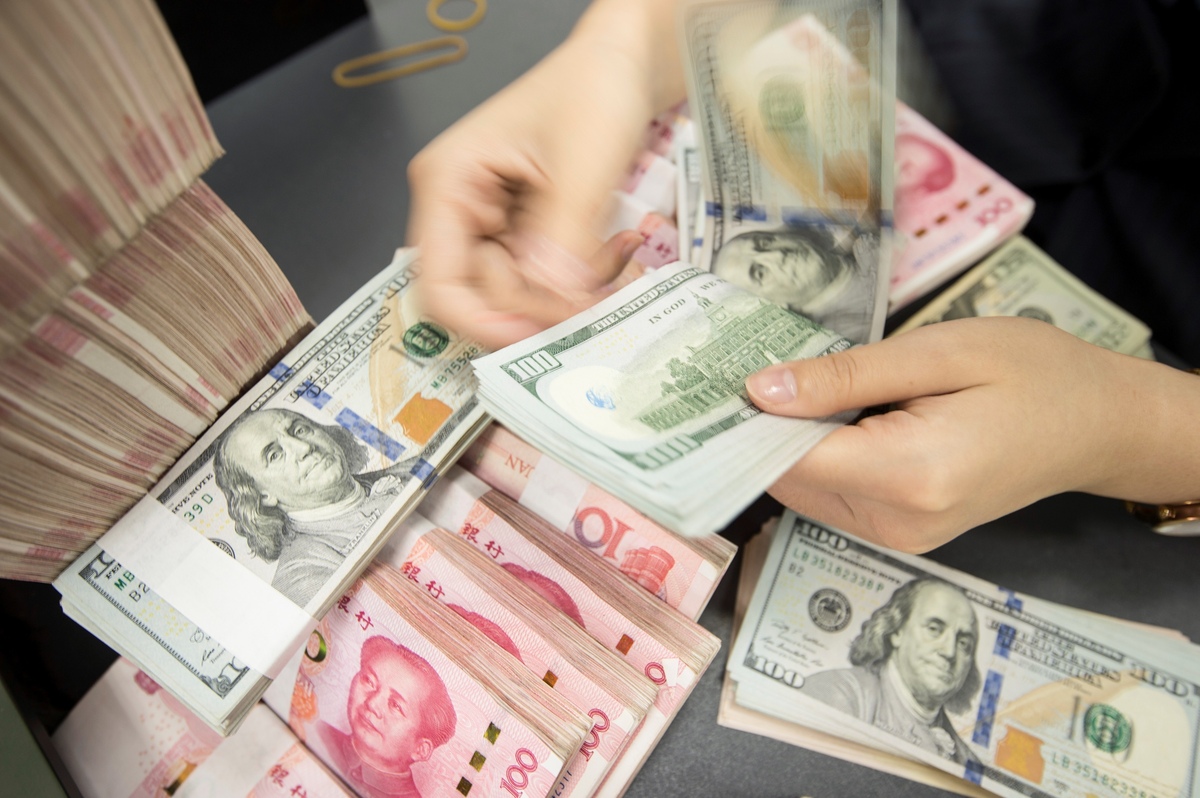
A Chinese bank employee counts 100-yuan notes and dollar bills at a counter in Nantong, in China's eastern Jiangsu province, on Tuesday.
AFP/Getty Images
veil caption
toggle caption
AFP/Getty Images

A Chinese bank employee counts 100-yuan notes and dollar bills at a counter in Nantong, in China's eastern Jiangsu province, on Tuesday.
AFP/Getty Images
Final Monday, China let the yuan tumble to its lowest charge since 2008. The currency is now trading at proper over 7 yuan to the dollar.
Later that day, the U.S. Treasury Department promptly labeled China a "currency manipulator."
The resolution is a step toward what would possibly well turn out to be an unfamiliar more or less currency battle, in which the U.S. would intervene to counteract the outcomes of China's weakened currency, or each and every countries even plot conclude steps to lengthen the price of the assorted's currency relative to their hold.
Right here are four things to know about how China manages its currency and what a currency battle would possibly well imply for the two countries.
Why did the yuan tumble in charge in essentially the most crucial position?
China's central bank, the Americans's Monetary institution of China, indicators every morning what its desired international alternate rate for the yuan will seemingly be, and permits it to rise or fall during the day. For the excellent 11 years, China has kept its currency beneath a symbolic 7-to-1 ratio to the dollar — till excellent week.
It is a expansive commerce. Since 2016, China's monetary policy has truly been to prop up the yuan's charge.
"Over the previous several months, the [market] stress has been toward a weaker yuan, nonetheless China has been resisting [depreciation of the yuan]," says Brad Setser, a senior fellow at the Council on International Family members and a historic deputy assistant secretary at the Treasury.
But financial forces are making that indispensable more difficult. China is experiencing signs of a slowing economy as home debt and an old-well-liked industrial sector plot conclude their toll. Its exports own also taken a success as a result of U.S. tariffs imposed over the excellent year, inserting more downward stress on the yuan. Monday's tumble within the yuan's valuation now brings the currency nearer to what economists set up in mind its merely market charge.
"China is no longer required to face up to market stress for a weaker currency," Setser says.
In a sense, analysts negate, China has given in to monetary stress largely due to U.S. tariffs. A weaker currency has the bonus of establishing China's items more cost-effective for American patrons, which can offset one of the tariffs.
So is China a currency manipulator?
The 2015 Alternate Enforcement Act lays out three criteria for what constitutes manipulation:
- an annual $20 billion bilateral surplus with the U.S.
- a broad enough total most up-to-date memoir surplus (above 3% of the nation's annual GDP).
- "persistent, one-sided intervention" within the international-alternate market to depreciate its currency.
China meets most appealing essentially the most crucial of those three criteria, based utterly mostly on the Treasury's most most up-to-date document on the topic in Would possibly perhaps perhaps additionally.
China does carefully arrange its currency to make a choice the yuan at a trusty and centered charge through a bunch of measures, chiefly through buying and promoting U.S. dollar bonds and controlling the outflow of yuan from its borders. But those actions pause no longer rise to the stage of currency manipulation, consultants in China and the U.S. argue.
"I personally witness this as a U.S. tactic of inserting low stress on China," says Wang Huiyao, president of Beijing-based utterly mostly mediate tank, the Center for China and Globalization, and an adviser to China's Cupboard.
Setser says there was a interval when China did unequivocally qualify as a currency manipulator. From 2003 to about 2013, he says China consistently intervened to depreciate the yuan by buying up billions of dollars in international exchange. When China buys up many of dollars, it makes the U.S. currency dearer relative to the yuan, which device the Chinese currency turns into weaker.Still, the U.S. complained nonetheless did no longer show China to be a currency manipulator.
"The perception was that China would possibly well react negatively and that the more productive course was one of serene negotiation and serene dialogue. You would debate whether or no longer that was the finest different," says Setser.
What would a currency battle be aware admire?
The U.S. would possibly well threaten to snatch up sizable portions of Chinese govt bonds, which would push up the yuan's charge, even though China wants it to depreciate. But China can also counter by buying up more U.S. Treasury bonds, driving up the dollar.
China has also long been pushing for its currency to overtake the dollar in global influence. "If the U.S. continues to push in [a currency dispute], then China doubtlessly will velocity up the globalization of the renminbi as a currency for global alternate," says the Cupboard adviser Wang, the usage of an different establish for the yuan.
What happens next?
The Trump administration would possibly well receive an even justification for mountain mountain climbing tariffs on Chinese items to the U.S. to offset any export advantage won through a weaker yuan. That would spoil global alternate ideas, nonetheless the U.S. has already flouted those laws by levying tariffs on Chinese imports as section of the continuing alternate battle.
The U.S. would possibly well originate negotiations with China during the World Monetary Fund, nonetheless the talks is also viewed as symbolic: The U.S. lacks the coolest device to retaliate against a nation for manipulating its currency.
Up to now, China has argued that the fluctuation within the yuan alternate rate is thanks to market forces. Chinese alternate consultants negate extra devaluation would be unstable for China's hold economy, suggesting the nation will no longer push the yuan indispensable lower.
"It's disagreeable for imports, and it's disagreeable for our capital sources," explains He Weiwen, a historic industrial attache at Chinese consulates within the U.S. That is as a result of establishing the yuan weaker device China will own a more difficult time paying off dollar-denominated debt and buying imports. It would also depreciate the price of Chinese yuan-held sources.
View Source













Post A Comment: